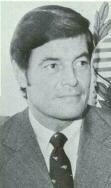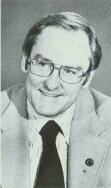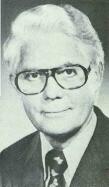
Illinois presidential possibilities in 1980
IN THE history of the United States, there have been only two successful presidential candidates who lived in Illinois when they were elected. Both of them were born in other states, and both were Republicans. Now, in the space of the past year and six months, we have produced three aspiring or potential candidates for the GOP nomination: one announced, one "exploring" and one waiting in the wings. They are respectively, U.S. Reps. Philip Crane (R., Mount Prospect) and John Anderson (R., Rockford) and Illinois Gov. James Thompson. All were encouraged by the weakness in the polls shown by President Carter several months ago, but each has different weaknesses in seeking the GOP nod, according to knowledgeable Republican sources in Washington. According to these sources. Crane appears to be in the best position of the three, but that is not saying much. Charles Black, chief political strategist and campaign director of the Republican National Committee, says Crane, unlike Anderson, starts out with a workable base — a bloc of committed voters and partisans in the American Conservative Union. As president of the ACU, Crane has been gearing up for his presidential drive with a stream of continuing position papers from Washington and a series of speeches around the nation. Crane's conservative base But Black says the ACU is a "little" base. "He still has some roadblocks. His first problem is that if other conservative candidates jump in, he won't have the field to himself and he has no statewide base to fall back upon." There have been reports of dissension within the ACU over Crane's candidacy. An aide to House Minority Leader John Rhodes views Crane's problems differently. "He whips up people and has enthusiastic supporters all over. But, there's the Ronald Reagan problem [Reagan dominating the race if he enters]." Crane has advantages, though, according to this source: "Organization and fund-raising, both through the ACU. He gets the media coverage by being an interesting speaker, but he scares a lot of people with what he says. But he could come in with a good base to beat a field of moderates." Still, Rhodes' aide says Crane faces a potential ideological split in the convention. "If he gets the nod then, it won't be worth much." His conclusion: "Phil's positioning himself for 1984." If Crane has problems, though, Anderson has more. "Though Anderson has come far since his anti-Nixon Watergate days of 1973-74," this same source said, "there are a lot of activists — and they're in the majority in the party — who are classic Bourbons: they remember everything and learn nothing. They won't accept Anderson. "For Anderson and Thompson to win, they would have to mount a nationwide registration drive to get new voters and new blood into the party. And that's a monumental task." Anderson's moderate key Black was even more negative about the Anderson candidacy. "Anybody who runs out of the House without a statewide base is a real longshot. The key for Anderson is to carve out the territory and become the moderate standard-bearer. I think he's looking at Mo Udall's race on the Democratic side in 1976. But there Udall had the activists and the liberal wing of the party — and even then he was dead after April. "The reverse is true in the GOP," Black continued. "The activists are in the conservative wing." Anderson does have one backer, though. An official of the Democratic Continued on page 24. November 1978 / Illinois Issues/35 National Committee (DNC), given the choice of facing any of the three Illinoisans, said Anderson would be the toughest opponent for President Carter because he could successfully chip cracks in Carter's constituency. Thompson's opportunity As far as Thompson's chances go, a the sources agree that his standings depend on the impressiveness of Thompson's win over Mike Bakalis on November?. Nobody questions that Thompson will win; the only question is the size of his majority. The DNC official, two months before the election, has given up on Bakalis. Black's comment is typical. "Thompson has a statewide base if he wins big this fall. He would then draw more attention to himself with electoral success in a big industrial state," which the GOP needs if it is to reclaim the White House. Black also held out the hope that Thompson could avoid the intraparty warfare which would accompany an Anderson or Crane nomination. "I [Thompson] has never really defined himself philosophically because he'll never really had to," Black commented. "If he can do so and prevent the two wings of the party from splitting, he'll have a better shot than the other two." Rhodes' aide pointed, however, to problem that Thompson may have with the GOP right. "You've got a lot of purists there who would rather drown with their man than get somebody electable. That will cause a split at convention time." Black, however, wrote the end of the whole discussion by saying, "It's a wide open race, and the more Carter drops in the polls, the more people will get into it on our side."
|
||||||||||||||||||



